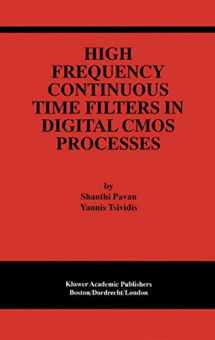
High Frequency Continuous Time Filters in Digital CMOS Processes
ISBN-13:
9781475784299
ISBN-10:
1475784295
Edition:
Softcover reprint of the original 1st ed. 2000
Author:
Shanthi Pavan, Yannis Tsividis
Publication date:
2013
Publisher:
Springer
Format:
Paperback
238 pages
Category:
Computer Science
FREE US shipping
Book details
ISBN-13:
9781475784299
ISBN-10:
1475784295
Edition:
Softcover reprint of the original 1st ed. 2000
Author:
Shanthi Pavan, Yannis Tsividis
Publication date:
2013
Publisher:
Springer
Format:
Paperback
238 pages
Category:
Computer Science
Summary
High Frequency Continuous Time Filters in Digital CMOS Processes (ISBN-13: 9781475784299 and ISBN-10: 1475784295), written by authors
Shanthi Pavan, Yannis Tsividis, was published by Springer in 2013.
With an overall rating of 4.3 stars, it's a notable title among other
Computer Science
books. You can easily purchase or rent High Frequency Continuous Time Filters in Digital CMOS Processes (Paperback) from BooksRun,
along with many other new and used
Computer Science
books
and textbooks.
And, if you're looking to sell your copy, our current buyback offer is $0.3.
Description
There is an ever increasing trend towards putting entire systems on a single chip. This means that analog circuits will have to coexist on the same substrate along with massive digital systems. Since technologies are optimized with these digital systems in mind, designers will have to make do with standard CMOS processes in the years to come. We address analog filter design from this perspective. Filters form important blocks in applications ranging from computer disc-drive chips to radio transceivers. In this book, we develop the theory and techniques necessary for the implementation of high frequency (hundreds of megahertz) programmable continuous time filters in standard CMOS processes. Since high density poly-poly capacitors are not available in these technologies, alternative capacitor structures have to be found. Met- metal capacitors have low specific capacitance. An alternative is to use the (inherently nonlinear) capacitance formed by MOSFET gates. In Chapter 2, we focus on the use of MOS capacitors as integrating elements. A physics-based model which predicts distortion accurately is presented for a two-terminal MOS structure in accumulation. Distortion in these capacitors as a function of signal swing and bias voltage is computed. Chapter 3 reviews continuous-time filter architectures in the light of bias-dependent integrating capacitors. We also discuss the merits and demerits of various CMOS transconductance elements. The problems encountered in designing high frequency programmable filters are discussed in detail.


We would LOVE it if you could help us and other readers by reviewing the book
Book review

Congratulations! We have received your book review.
{user}
{createdAt}
by {truncated_author}


